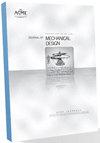Hit, Miss, or Error? Predicting Errors in Design Decision Making for Radically Innovative Ideas Using Individual Attributes
IF 3
3区 工程技术
Q2 ENGINEERING, MECHANICAL
引用次数: 0
Abstract
Abstract Researchers and practitioners alike agree that for companies to survive and thrive they must develop and support radical innovation. However, these ideas are complex and risky, and not all succeed. Because of this, decision makers are often left to make hard decisions in terms of which ideas can move on and which are abandoned. The goal of this article was to provide evidence on the impact of individuals’ preferences for creativity on the effectiveness of their decision making for radical ideas using principles from signal detection theory (SDT). To do this, we used data from a previous study of 2252 idea evaluations by engineering students and classified these decisions based on SDT to see if we could predict the likelihood of occurrence of hit (correct identification), miss (type 1 error), false alarm (type II error), and correct rejection. The results showed that lower levels of risk tolerance resulted in an increased likelihood that a hit occurred. On the other hand, higher levels of motivation resulted in an increased likelihood of a type I error occurring, or that an individual would more likely neglect a good idea that had a high chance of future success. Finally, increased risk tolerance resulted in an increased likelihood that type II error occurred, or that an individual would expend resources on an idea with limited likelihood of success. The results serve as empirical evidence on decision making in radically innovative tasks and provide a methodology for studying decision making in innovative design.命中,错过,还是错误?利用个体属性预测激进创新理念设计决策中的错误
研究人员和从业人员一致认为,企业要想生存和发展,就必须发展和支持激进的创新。然而,这些想法既复杂又有风险,而且并非都能成功。正因为如此,决策者常常不得不做出艰难的决定,决定哪些想法可以继续发展,哪些想法可以放弃。本文的目的是利用信号检测理论(SDT)的原理,为个人的创造力偏好对激进思想决策有效性的影响提供证据。为了做到这一点,我们使用了之前对工程专业学生的2252个想法评估的研究数据,并基于SDT对这些决策进行分类,看看我们是否可以预测命中(正确识别)、错过(类型1错误)、假警报(类型2错误)和正确拒绝发生的可能性。结果表明,较低的风险承受能力会增加发生撞击的可能性。另一方面,高水平的动机导致I型错误发生的可能性增加,或者一个人更有可能忽视一个有很大机会在未来成功的好主意。最后,风险容忍度的提高导致第二种错误发生的可能性增加,或者个人会在成功可能性有限的想法上花费资源。研究结果为根本性创新任务中的决策提供了实证证据,并为创新设计中的决策研究提供了一种方法。
本文章由计算机程序翻译,如有差异,请以英文原文为准。
求助全文
约1分钟内获得全文
求助全文
来源期刊

Journal of Mechanical Design
工程技术-工程:机械
CiteScore
8.00
自引率
18.20%
发文量
139
审稿时长
3.9 months
期刊介绍:
The Journal of Mechanical Design (JMD) serves the broad design community as the venue for scholarly, archival research in all aspects of the design activity with emphasis on design synthesis. JMD has traditionally served the ASME Design Engineering Division and its technical committees, but it welcomes contributions from all areas of design with emphasis on synthesis. JMD communicates original contributions, primarily in the form of research articles of considerable depth, but also technical briefs, design innovation papers, book reviews, and editorials.
Scope: The Journal of Mechanical Design (JMD) serves the broad design community as the venue for scholarly, archival research in all aspects of the design activity with emphasis on design synthesis. JMD has traditionally served the ASME Design Engineering Division and its technical committees, but it welcomes contributions from all areas of design with emphasis on synthesis. JMD communicates original contributions, primarily in the form of research articles of considerable depth, but also technical briefs, design innovation papers, book reviews, and editorials.
 求助内容:
求助内容: 应助结果提醒方式:
应助结果提醒方式:


